What you need to know to help yourself or a loved one transition to assisted living or memory care, including how Greater Akron’s Heritage Crossing Assisted Living gives residents the opportunity to thrive
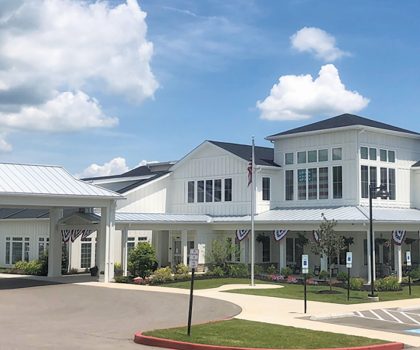
By Mary Malik
The decision to transition to an assisted living community just got easier and less intimidating thanks to the staff, the care, and the lifestyle that awaits you at Heritage Crossing Assisted Living in Greater Akron. This special four-page section reveals important questions and answers to assist in making your decision.
Introduction
“Our goal here is to guide your family through this decision with knowledge, expertise and compassion,” says Heritage Crossing Assisted Living Executive Director, Stephanie Chambers. “As a Cappella Living Solutions community, we approach things here very holistically. For every decision we make, whether it involves a resident’s health or the day-to-day operations, we consider how it will affect the residents physically, mentally, socially and emotionally. This ensures we have everyone’s best interests in mind at all times.”
Because Heritage Crossing is a resident’s new home, there is more to life here than meeting basic physical and medical needs. The staff feels that it’s equally important for residents to take part in activities, make friends, discover new interests and thrive in their environment.
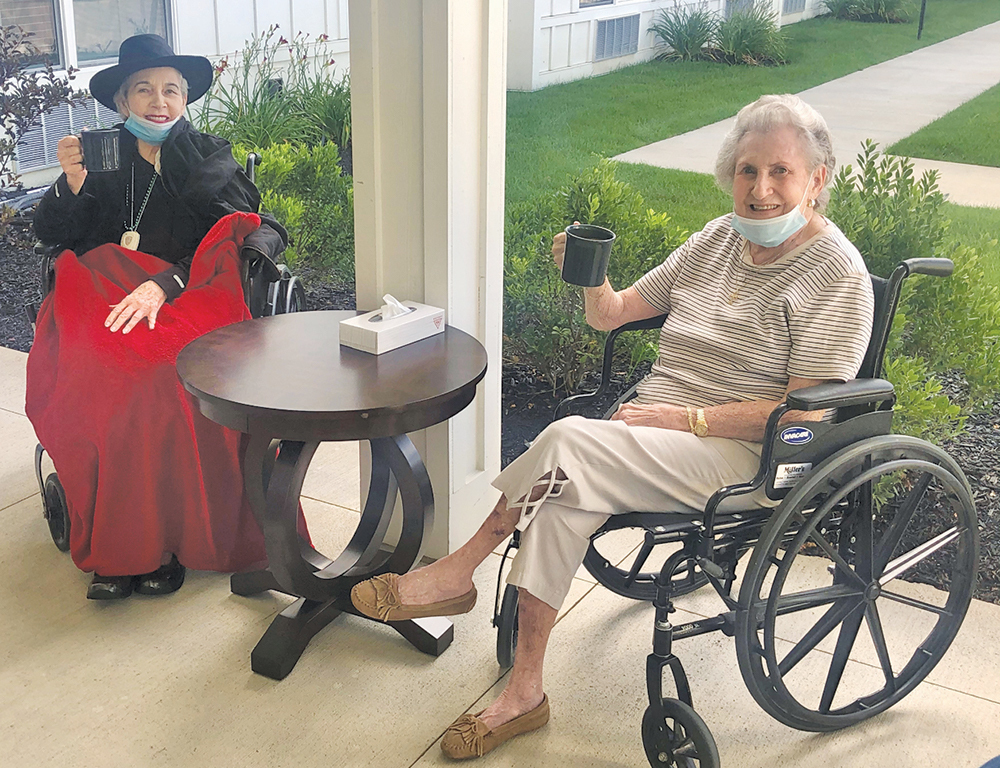
“Daily activities provide an opportunity for residents to meet new people and form new friendships,” says Director of Sales and Marketing, Brenda Louis. “We never push residents to join in, but are often amazed at the positive changes in just a short amount of time when they do.”
A Talented, Dedicated Staff
Stephanie says that the high standards at Heritage Crossing begin with the staff. Both the leadership team and day-to-day staff members are highly credentialed and many have worked in the senior living industry for years.
“I have an Ohio nursing home administrators license, an Ohio CEAL, (Certified Executive for Assisted Living), a master’s degree in healthcare management, and often speak on these topics and specifically what makes our team here so successful,” says Stephanie. “My mother was a senior living administrator so it’s in my blood. And she was a resident in an assisted living community, which is why I feel such a connection to our amazing families. I see my mother in every resident at Heritage Crossing and I relate to the families on a personal level.”
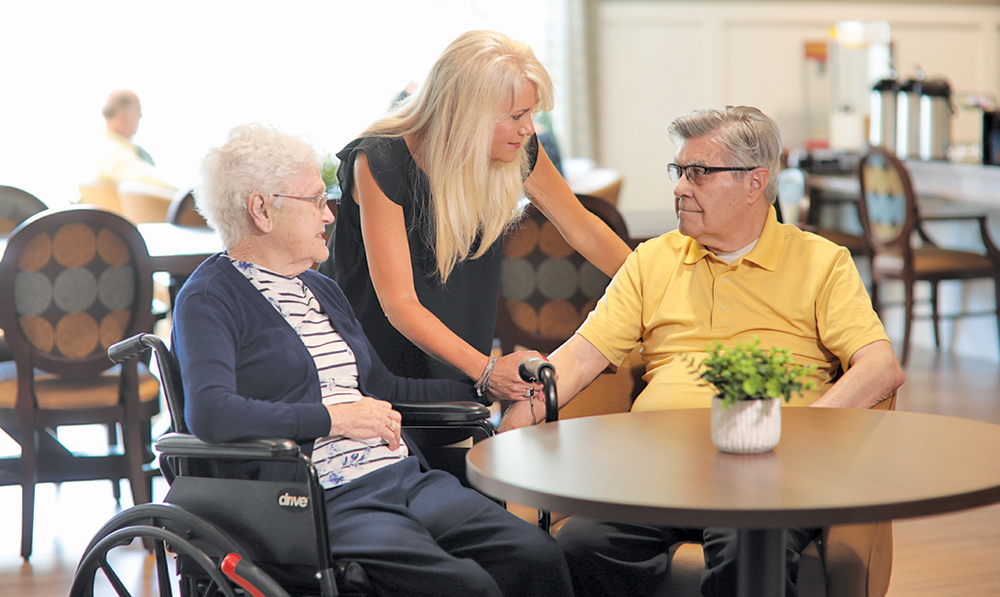
Heritage Crossing boasts a 4.9 out of 5 rating from families for overall satisfaction and a favorability rating of 100% from families who would recommend Heritage Crossing to friends. This connection to families is why Stephanie gives her personal cell phone number to every family member.
“I believe that most problems can be easily solved if I hear about it and address it quickly,” says Stephanie. “We also communicate any changes here through phone calls, emails to families, and monthly virtual town halls.”
Staying Active and Engaged
Completed in February, 2019, Heritage Crossing is pet friendly, and residents choose from a variety of apartment sizes—all with a refrigerator and microwave oven. Loaded with natural light, there are 9-foot ceilings, spacious common areas for residents to gather, a movie theater, hair salon, fitness center, private dining room, cafe for snacks and coffee with friends and a creative studio.
“Our creative studio is a beautiful space where residents take part in art classes and other special projects,” says Brenda. “We have a teaching kitchen where our chef prepares special recipes as residents gather around the kitchen island to watch, learn and eat.”
Covid-19 has required that we become more creative with the ways we engage our residents while keeping everyone safe.
“It’s been challenging but we’ve been able to get our residents out to local parks and do a lot of one-on-one activities,” says Brenda. “We have beautiful green spaces for residents to enjoy in the nice weather, too. Even though it’s been difficult, our families are relieved that their loved ones are not alone.”
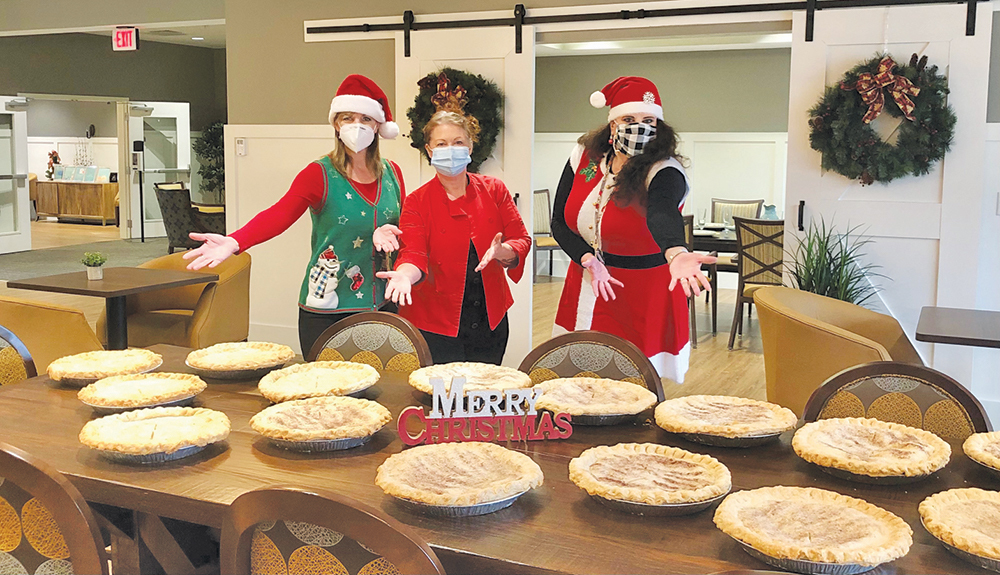
Customized Care
At Heritage Crossing, the staff has created a home for each resident where success is based on customized care that revolves around the individual’s specific needs and desires. Families complete an extensive questionnaire before residents arrive to be sure their loved one’s particular needs are met.
“One gentleman wasn’t eating well and he couldn’t tell us why,” says Stephanie. “One call to the family and they told us he likes his newspaper with him when he eats. A very simple solution and he was back on track.”
The Heritage Crossing staff understands that community living is a big change for the residents.
“The building was designed as a home,” says Stephanie. “We don’t want our residents to remain in their apartments and become isolated. Most come from large homes with many rooms so apartment living can be an adjustment. We have several cozy sitting areas, a library complete with computers, a game room overlooking our courtyard and lots of other spaces for residents to spend their time. This community was developed with your every need in mind and we want you to feel welcome, cared for, safe and most of all, at home.”
Heritage Crossing Memory Care
The memory care program at Heritage Crossing was developed with the understanding that people living with dementia experience the world differently. The one-of-a-kind programming—Rhythms Dementia—is based on the belief that an enriching community plays an important role in supporting each individual’s ability to safely and successfully experience a life worth living.
Residents here experience a holistic approach to support them in their journey by combining Rhythms Dementia programming with family involvement and the vigilant care and attention of care partners to support the residents and reinforce their growth and happiness.
“Rhythms Dementia focuses on understanding how dementia impacts each individual and then tailors the specific approach to follow the natural and unique rhythms for that person,” says Brenda. “Programming then focuses on engaging the individual’s passions and abilities. This reinforces that sense of purpose that everyone needs.”
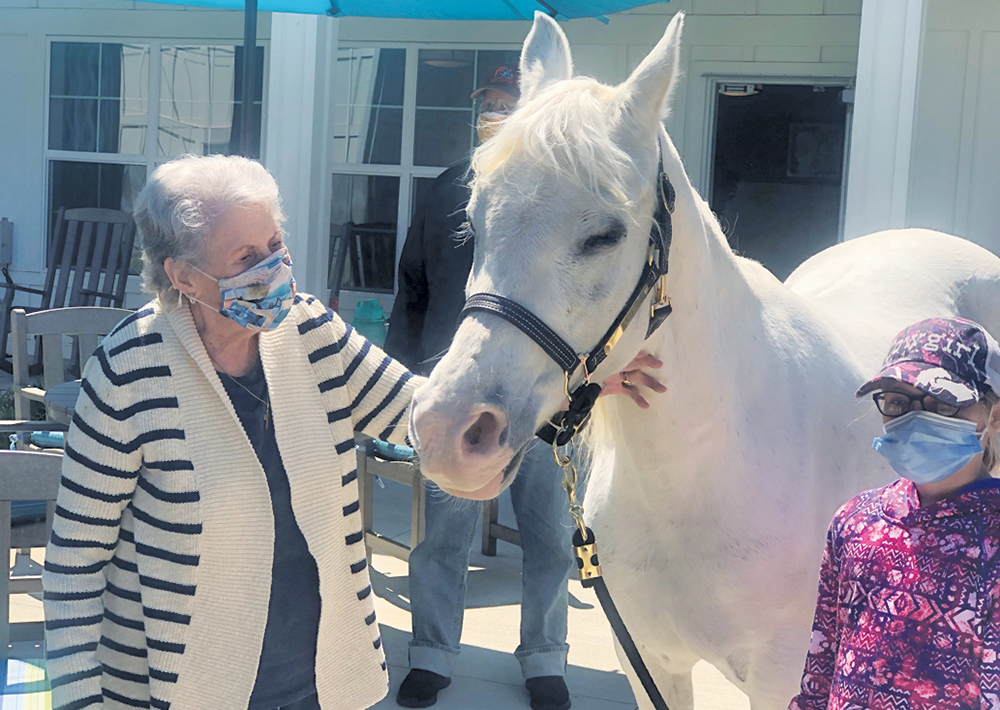
Communicating With Residents
The care partners approach to residents with dementia involves first identifying and then accommodating needs by learning to “read” a resident’s actions, expressions and emotions that may be used to communicate. Care partners are trained to recognize how their responses to the residents contribute to each person’s ability to flourish in the community.
“The majority of anxiety and distress that is experienced by people living with dementia is not due to the physical disease but more to their environment and how people interact with them,” says Stephanie. “‘Behaviors’ and ‘sundowning’ are a communication of unmet needs. The person is trying to tell us that something is not right. It’s our job to figure out what they are telling us and adapt our approach to meet their needs.”
Positive Experiences From The Past
The staff at Heritage Crossing also knows that in order to thrive, memory care residents must first feel safe in their environment.
“Fostering this feeling of safety is accomplished through our programs and amenities that aim to support positive experiences from the past,” says Stephanie. “This is one more area where the families are a big help.”
Resident’s family members provide the staff with important background information, likes and dislikes, hobbies, passions and anything that may help care partners to provide comfort and familiarity for the residents.
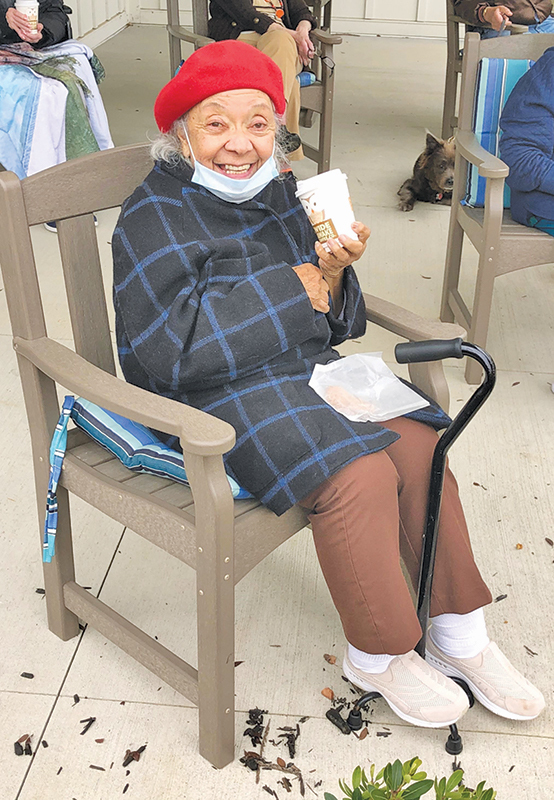
“We first learn each person’s natural rhythm of life and we adapt to that,” says Brenda. “If we know that a resident was a gardener, maybe loved to cook or had a passion for history or reading, that can help us to connect. Are they early risers? Do they like to sleep in? What are their favorite comfort foods? Engaging a person living with dementia in something familiar to them often has a calming effect. It’s these personal interactions and relationships with our residents that makes Heritage Crossing exceptional at memory care. It’s all about understanding the challenges involved with dementia and what that means for each individual. Once we understand that, we can plan our approach and set our residents up for success.”
The Heritage Crossing Memory Care staff uses a variety of tools and techniques like validations, music, arts and much more to meet individual needs and family and friends are an integral part of the team.
“We take education very seriously here at Heritage Crossing,” says Stephanie. “We know that the person who has the disease is not the only one living with dementia. Our goal is to educate and support your entire family on this journey.”
Decision Time
Managing any level of care for yourself or that of senior loved ones, especially during the Covid-19 pandemic, has forced many families to consider assisted living to ensure the health and safety of themselves or a family member.
Making this decision comes with many questions. How do you know when it’s time? The staff at Heritage Crossing helps you make these decisions and understands that every person, every family, and every life experience is unique.
“It’s important to focus on the individual,” says Stephanie. “And we work closely with the family to be sure we are addressing everyone’s needs. The main goal is always the resident’s health and happiness and the journey starts with answering some important questions.”
1. Evaluate Needs. How are you or your loved one managing at home these past several months? Often the desire to stay at home can mask the daily struggles someone is experiencing. Sometimes asking, why is living at home no longer an option, sheds light on the needs that are not being met in the current living situation. Having an honest conversation can help evaluate whether there is enough help available on a daily basis to make staying at home an option.
2. Family Strain. Is the family member’s living situation causing stress within the family? When an aging loved one is on their own, it often creates constant stress and strain for all involved. The worry and expense of daily management of home aides and family visits, along with managing your own schedule, can be overwhelming. Heritage Crossing takes that worry and stress away for everyone and visits can go back to being about family time.
3. Social Interaction. Gerontological research shows that the greatest factor causing functional decline in older people, other than the physical aspects of aging, is “social isolation.” Have you or a loved one become too isolated at home? It may be time to think about assisted living.
“People who are still able to care for themselves physically are often so focused on getting through the day that they neglect the stimulation only social interaction can provide,” says Brenda. “Heritage Crossing residents participate in a full range of activities with their neighbors, or can enjoy the privacy of their own apartment home with help available when they need it.”
Residents also remain part of the greater community by traveling to events and outings when appropriate.
4. Misguided Advice. Well-meaning doctors often advise nursing care for seniors who aren’t managing well on their own. But help with everyday activities—like dressing, bathing, grooming, medications, and memory support is often just the right amount of support your loved one needs to thrive again. At Heritage Crossing a full-time professional nurse is always available when needed.
Summary
Heritage Crossing knows that when a loved one has dementia, the whole family is living with dementia. The Heritage Crossing staff becomes a part of your “team” whose goal is to care for and support your loved one in the safety of this environment. Heritage Crossing understands that a move to an assisted living or memory support community is a big decision.
“Our goal is to be a resource for families to navigate what, for most, is uncharted territory,” says Brenda. “We accomplish this by being good listeners, showing empathy, and compassion. The focus is always about the family and their loved one.”
When is it Time for Assisted Living?
To learn more, join Heritage Crossing for a virtual event on Monday, February 22 at 12 p.m. Register by calling 330-422-3386.
Heritage Crossing Assisted Living & Memory Care is located at 251 N. Cleveland Massillon Road near Bath, Copley, Fairlawn and West Akron. For more information and to schedule a tour, call 330-422-3386 or visit HeritageCrossingLiving.com.
